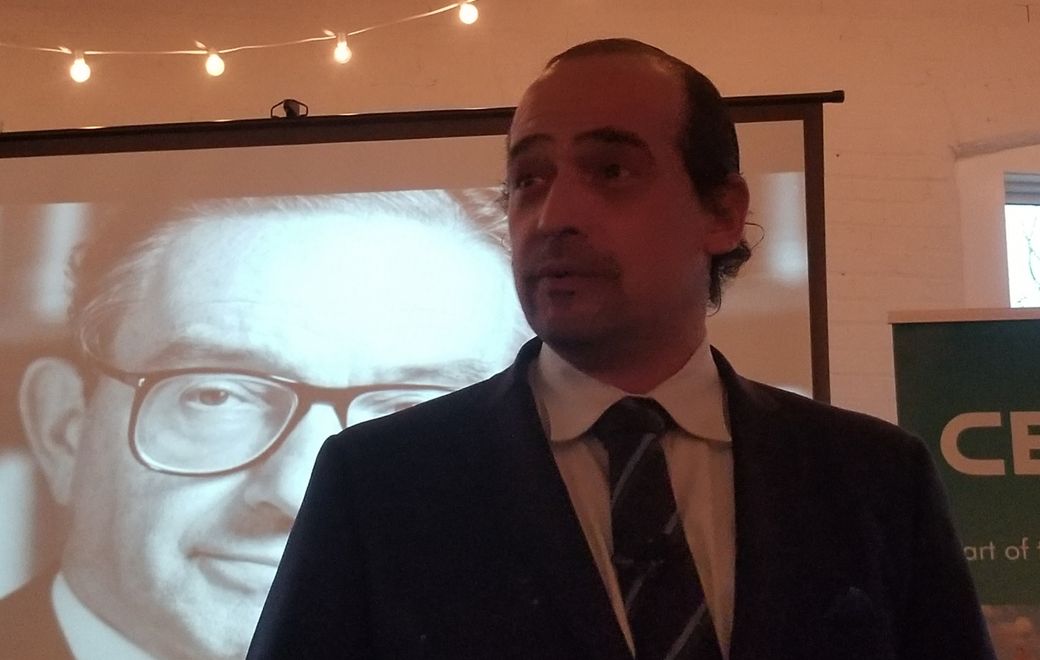
Buffalo is doing well in creating a live-work-play environment to attract and retain talent, but Western New York needs to do a lot more.
It needs to do more to leverage the University at Buffalo.
It needs to make it easier to do business locally.
It needs to strengthen ties to Toronto and improve access to the region by train and especially by air if it is going to attract more foreign investment and grow its economy.
That was the view of a veteran commercial real estate economist, who travels the globe for one of the world’s biggest brokerage firms. His stop in Buffalo was his last trip anywhere for at least six weeks, after his company grounded everyone because of fears about the novel coronavirus.
But those fears – which Spencer Levy called an overreaction – didn’t stop him from speaking to nearly 200 people at CBRE-Buffalo’s annual MarketView presentation.
Levy – the firm’s senior economic adviser and chairman of Americas research – said too much attention is paid to geopolitics and national politics, and not enough to local issues, when it comes to analyzing local economies and commercial real estate.
While he expressed some concerns about the temporary impacts of the coronavirus, he said that neither the recent impeachment trial of President Trump nor the presidential campaign would have any real effect on real estate.
“We’re going to be just fine,” he said. “U.S. presidents simply do not have the power to bend the curve on growth like people think they do. The U.S. economy is big. The global economy is bigger.”
Levy said secondary and tertiary real estate markets like Buffalo have a real opportunity to be competitive with other metropolitan areas – including the biggest “mega-cities” that have traditionally attracted more jobs, wealth and investment. He cited Columbus, Indianapolis and Pittsburgh as cities to emulate.
“You can go to some of these small cities and attract world-class talent,” he said. “Buffalo has a lot of great things going for it.”
But to do that, he said, they need to focus on what he termed “Spencer’s five factors of awesomeness” – talent, foreign money, live-work-play, the ease of doing business and infrastructure – which he uses to score every city around the world that he travels.
In Buffalo, “the live-work-play environment is better than people think,” Levy said, citing the Cooperage mixed-use building that houses Resurgence, a distillery, offices and apartments.
“A lot of people think of a cold-weather city, and that is simply not the case,” he said in an interview. “A lot of people like outdoor activities here. Summers here are spectacular.”
He also cautioned against allowing uniformity, stressing instead the importance of a city’s individuality.
“The world has become infected by generic hipsters,” he said, relating a story of ordering a “Russian” beer at a bar in Moscow, only to get a Budweiser, or trying to get a traditional Cuban coffee in Miami but being stuck with a latte instead. “You have to maintain your local character in order to attract and retain talent. That local stuff really matters.”
It’s “not just the mood” but also the architecture and features. “Do you know what Class A office is?” he asked. “It’s whatever it takes to get the best talent into your building.”
But he said the region needs to do more to leverage two of its biggest economic drivers: the University at Buffalo, and the proximity to Toronto.
“University at Buffalo is a fine school now, but continuing to improve that school will attract higher-quality New York kids, will attract higher-quality international kids, which will bring in money and everything,” Levy said. “You punch above your weight on talent. You just have to keep them here.”
In fact, he said, universities can also be a major source of foreign investments, citing a $100 million office building in Nashville that he just sold to a buyer from Bahrain.
“How did he find Nashville on a map?” Levy asked. “His kid went to Vanderbilt.”
Today, besides “mega-cities,” top destinations for foreign dollars include Salt Lake City, Cincinnati and San Antonio.
“This is what’s relevant to Buffalo,” Levy said. “If they’re going to go to Cincinnati, why aren’t they coming here? It’s a question you should be asking yourselves. It’s a question you should be asking them.”
The region’s infrastructure is also a problem, Levy said. While local transportation is on par with other cities, that’s not the case for intercity travel – the ability to get to Buffalo from elsewhere. Compared to regional rivals like Cleveland or Detroit, he said, Buffalo falls short.
“Your airport is a negative,” he said in the interview, citing the “lack of direct flights domestically and almost no flights internationally.”
And he again pointed north. “If I were to make one suggestion into Andrew Cuomo’s ears, it would be a high-speed train from here to Toronto,” he said. “It is mega-city 101. You could leverage off that like wildfire.”
Finally, while Western New York benefits from low costs, the “ease of doing business” is a struggle for Buffalo, he said. According to a study he cited by Arizona State University, Buffalo ranks 68th out of 77 cities. Oklahoma City is easiest, while San Francisco is hardest. Detroit was 55th, while Cleveland was 26th.
“I’m not saying this is fatal to Buffalo, but it’s one of the things investors look at,” he said. “Your city is immobile, but talent and capital can go anywhere, and they will go where they can get the best returns.”
Published by The Buffalo News





